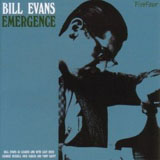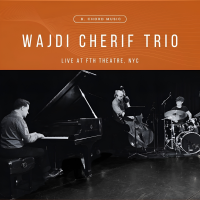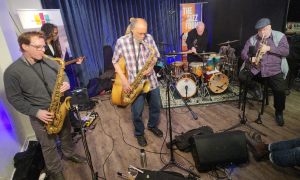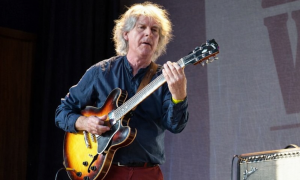Home » Jazz Articles » Live Review » Ottawa Jazz Festival Day 4: June 24, 2007
Ottawa Jazz Festival Day 4: June 24, 2007
Day four of the TD Canada Trust Ottawa International Jazz Festival gave its audience a difficult choice: party time at Confederation Park with Rumba group The Conga Kings or an exploratory and completely spontaneous performance by genre-busting guitarist Bill Frisell. With a packed house at Frisell's special 8:00 PM event at Library and Archives Canada and a strong turnout at the park, it turns out that the OIJF planners made the right choice: the diverse programming is working to satisfy a broad spectrum of fans.
Chapter Index
But first, the 5:00 PM Connoisseur series marked the return of a festival favorite, Canadian-born but US- based pianist Renee Rosnes. Rosnes and her trio, featuring two other Canadian jazz heroes—bassist Neil Swainson and drummer Terry Clarke—delivered a nearly 90-minute performance, combining the uncomprehendingly underappreciated pianist's takes on a number of standards with a couple of strong originals that had the capacity audience captivated from the first note. With the renowned consistency of the Connoisseur Series it's hard to pick a favorite at this point, but Rosnes' performance. no doubt, will go down as one of the high points of this year's series.
It's been a couple of years since Rosnes' last recorded release as a leader, but she's been busy with, amongst other things, the SF Jazz Collective, responsible for four seasons of imaginative modern mainstream music, combining original compositions by the octet with a focus each year on creative arrangements of music by a different jazz icon. Since its inaugural season in 2004 the SF Jazz Collective has paid tribute to Ornette Coleman (SF Jazz Collective (Nonesuch, 2005)), John Coltrane (SF Jazz Collective 2 (Nonesuch, 2006)), Herbie Hancock and Thelonious Monk.
 Rosnes, Swainson and Clarke don't play together often, but you'd be hard-pressed to find a more interactive post-bop trio. With plenty of eye contact, Swainson and Clarke not only navigated Rosnes' often challenging and up-tempo arrangements but drove them to new and unexpected places. It's not just that all three are fine musicians; it's that they are playing with ears and minds wide open, ready to take the slightest hint of an idea and run with it.
Rosnes, Swainson and Clarke don't play together often, but you'd be hard-pressed to find a more interactive post-bop trio. With plenty of eye contact, Swainson and Clarke not only navigated Rosnes' often challenging and up-tempo arrangements but drove them to new and unexpected places. It's not just that all three are fine musicians; it's that they are playing with ears and minds wide open, ready to take the slightest hint of an idea and run with it.
Clarke is a national treasure, having spent many years south of the border working with artists including Jim Hall, Toshiko Akiyoshi and Jay McShann. He may be in his early sixties, but there's no denying his ability to create the gentlest of pulses on one song, while burning hard and heavy the next. He's a regular at the OIJF, demonstrating a surprising fusion energy with Larry Coryell in 2004 and nuanced grace the following day with Bill Mays. With Rosnes he combined the best of both worlds, kicking things off with a fiery reading of "Summer Nights" and providing a New Orleans Second Line rhythm behind Rosnes' unusual take on Monk's "Green Chimneys," while demonstrating contrasting subtlety on Antonio Carlos Jobim's melancholy "Modhina."
Swainson is further evidence of Canada's vibrant jazz scene, a bassist who has worked with everyone from international names including Woody Shaw and George Shearing to Canadian stars Ed Bickert, Rob McConnell and P.J. Perry. Like Clarke there seems to be nothing beyond his reach. An appropriately elegant version of Duke Ellington's "Sophisticated Lady" featured the bassist bowing its familiar theme ("How do you hold this thing?" he quipped when Rosnes introduced the tune as his showcase number) before returning to pizzicato for a solo that was rich in thematic construction.
Thematic construction was also a clear definer of Rosnes' approach to improvisation. With unequivocal virtuosity she found ways to thread melodies through Cole Porter's "Just One of Those Things" and her own "Dizzy Spells" (named for Rosnes by trumpeter Jon Faddis, alluding to Dizzy Gillespie's pride in being a good speller), even at a breakneck clip. Motifs would be introduced and, as the solo developed, return in altered form, providing a clear narrative made all the more impressive for its sheer spontaneity. Like Joey Calderazzo two days prior, Rosnes connected with the audience in an unassuming and natural way, providing contexts for the songs she introduced ("I don't speak Porteugese," she said when introducing "Modhina," "so I'm not sure what the words say but I'm pretty sure it's about love and heartbreak") and a little Canadian humor when Swainson, at one point in the set, apologized, causing her to remark "You Canadians are always apologizing."
Despite starting a little late, and with the pressure of having to get the stage cleared for Bill Frisell's 8:00 PM performance, there was still no denying the audience an encore. Perhaps one of the best indications of just how much fun the trio was having was Clarke—normally deadpan, but here cracking just the slightest hint of a grin. That grin may have been lost on most of the audience, but the interaction and visceral power of this trio's ability to transform even the most familiar of tunes into something fresh and exciting was not. class="f-right">
While it was hard to believe that any more patrons could fit into the Library and Archives Canada theater than at Rosnes' show, the festival managed to squeeze a few more seats into the hall for Frisell's sold out performance, the first of three special events at the festival that will include a late-night duet performance by Toots Thielemans and Kenny Werner, and a concert by legendary drummer Roy Haynes and his young quartet later in the week. The ever-unassuming and affable Frisell, accompanied by longtime collaborator Tony Scherr on bass and newcomer Rudy Royston on drums, wasted no time jumping into his characteristic collage of sounds, derived from an array of pedals on the floor and placed on a stool in front of him.

There was plenty of material from Bill Frisell, Ron Carter, Paul Motian (Nonesuch, 2006), including Thelonious Monk's "Misterioso" and "Raise Four," and the ubiquitous "You are My Sunshine," as well as "Baba Drame" from The Intercontinentals (Nonesuch, 2003). But anyone who expects literal interpretations obviously doesn't know Frisell. While other configurations have more defined structure, including set lists and arrangements, a trio provides the opportunity for Frisell to go wherever his (and his bandmates') muse takes the music. Abstract passages filled with oddly processed guitar tones and jagged loops acted as interludes as the trio finds its way to the next song. There were definitive endings at a number of points, but the set's overriding continuity left the impression of an infinitely deep well-spring of ideas.
Frisell may have long since abandoned the mantle of jazz guitarist by narrow definition, but it hardly matters. He's an almost reluctant guitar hero, capable of searing distorted rock lines one moment and facile but skewed bebop lines the next. Facing inwards towards the band, and with Scherr across the stage doing the same with Royston in the center, communication—both visual and aural—was optimized. Frisell's idiosyncratic approach to even the most straightforward of tunes meant that there were plenty of surprises and an equal number of laughs throughout. Catching him emphasize the final note of the familiar theme to "Raise Four," with quirky dissonance, and the equally unconventional way that both Scherr and Royston interacted, was sufficient to remove any surprise that Frisell was commissioned, in the 1990s, to score music for a trio of historic silent feature films starring legendary comedian Buster Keaton.
To be able to work with the stylistic boundary busting that's inherent with Frisell, you have to be a special kind of player, able to stretch definitions and bring together disparate approaches. Scherr is as unconventional a bassist as Frisell is a guitarist, and a player with an equally vivacious sense of mischief. As capable of anchoring the group as he was of producing shining albeit brief solo spots (in some ways antithetical to Frisell's more conversational approach to improvisation), he may not be an ideal fit on all of the guitarist's projects. Still, when Frisell needs someone who can turn on a dime from twisted Americana to abstract density and defined swing, one would be hard-pressed to find a better partner.

l:r: Tony Scherr, Rudy Royston, Bill Frisell
Royston may appear to be the new kid on the block, but Frisell actually met him a decade ago, when the two played on trumpeter Ron Miles' outstanding Woman's Day (Gramavision, 1997). A player who combines the behind-the-beat backbeat of Jim Keltner with the textural colors and implied swing of Paul Motian, he's an ideal choice for the no-safety-net approach of this trio. He never soloed but was an equal and vital part of the ever-present chemistry that shaped the flow of the set.
Collaboratively-sensed intuition is essential for this kind of performance, but the chemistry between Frisell, Scherr and Royston combined at such a deep level that there were few visual cues, even less evidence of between-song communication amongst them, and a collective sense of dynamics that created a continual organic ebb and flow. The few looking for a conventional jazz performance may have been scared away within the first minutes of the show, but for those of the capacity crowd that remained, it was the closest thing to actually being inside the heads of these three players, for whom nothing was sacred and everything possible.
Tomorrow: John Geggie Group and UMO Jazz Orchestra.
Visit Renee Rosnes, Bill Frisell and the TD Canada Trust Ottawa International Jazz Festival on the web.
Photo Credits
Renee Rosnes: John Fowler
Bill Frisell: John Kelman
Day 1 | Day 2 | Day 3 | Day 4 | Day 5 | Day 6 | Day 7 | Day 8 | Day 9 | Day 10 | Day 11
Tags
PREVIOUS / NEXT
Support All About Jazz
 All About Jazz has been a pillar of jazz since 1995, championing it as an art form and, more importantly, supporting the musicians who make it. Our enduring commitment has made "AAJ" one of the most culturally important websites of its kind, read by hundreds of thousands of fans, musicians and industry figures every month.
All About Jazz has been a pillar of jazz since 1995, championing it as an art form and, more importantly, supporting the musicians who make it. Our enduring commitment has made "AAJ" one of the most culturally important websites of its kind, read by hundreds of thousands of fans, musicians and industry figures every month.
























